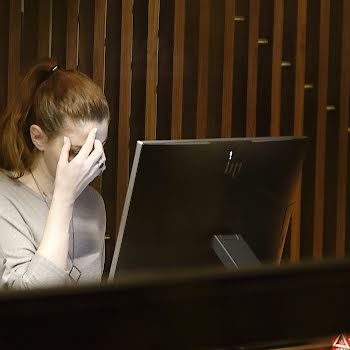The sex-for-rent crisis: Ireland’s housing emergency is fuelling gendered exploitation
The so-called ‘sex-for-rent’ crisis is a symptom of Ireland’s spiralling housing emergency, a crisis that disproportionately harms women, particularly vulnerable international students and migrant workers. It is also a glaring example of the state’s failure to protect them, writes Roe McDermott.
While Ireland criminalises the buying of sex from sex workers under the guise of protecting women, there is still no specific law against landlords and predators coercing women into sex in exchange for a place to live.
A new report from the Irish Council for International Students (ICOS) exposes the grim reality faced by international students: one in 20 has been propositioned with rent-free accommodation in exchange for sex, while one in seven has been offered accommodation requiring them to share a bed with a stranger. Alarmingly, 14% of respondents reported having to share a bed with someone they did not know before moving in.
Commenting on the report’s findings Ana Valdez, a Mexican student in Dublin, articulated the dire circumstances, saying “Decent housing is supposed to be a human right, and although Ireland is a beautiful country with great opportunities, the housing crisis has turned the country into a really bad and impossible experience for many people, resulting in overcrowding, poor mental health, sky-high costs, abuse by landlords and even sexual harassment.”
Further testimonials from international students in the report highlight the appalling conditions many are forced to endure. A female student from Brazil studying English commented “It’s unpleasant to share a bed with someone you don’t know.” Another female Brazilian student described her harrowing experience: “Since I arrived in Cork, I’ve lived in many different houses, like a student house where I shared a tiny bedroom with two other people paying excessive rent. I also lived in a house where the landlord lived. One of the rentals was through Hostpower, and without a doubt, this experience was terrible because the landlord monitored our steps, and there were set times to use the kitchen, plus a timed schedule for the shower. I even had to share a bed with two people at different times, whom I had never met before, until after a year and a half, I finally got my own room. We went through many emotional ups and downs with accommodations here, many of them overpriced and in poor condition.” A Mexican student studying in higher education reported “I share a bed with someone that I met here in Ireland.”
Ireland’s housing crisis has pushed vulnerable tenants – particularly international students, women, and foreign nationals – into increasingly precarious living conditions. Skyrocketing rents, substandard housing, and lack of tenant protections have created a situation where exploitation flourishes.
Laura Harmon, executive director of ICOS, has called for urgent action: “Our new research exposes the alarming realities that international students in Ireland are struggling with to find safe, affordable and minimum-standard accommodation. The extent of financial strain and overcrowding is deeply concerning. Urgent action is needed to address these issues, in particular sex-for-rent exploitation, to ensure that Ireland remains a welcoming and supportive destination for international students.”
Ireland’s housing crisis has pushed vulnerable tenants – particularly international students, women, and foreign nationals – into increasingly precarious living conditions. Skyrocketing rents, substandard housing, and lack of tenant protections have created a situation where exploitation flourishes.
With average rents in Dublin now at €2,500 per month and wages failing to keep up, many international students are left with little choice but to seek housing through social media, where predatory landlords operate unchecked. More than 60% of students in the ICOS survey reported that half their salary goes toward rent; one in five spend 70% of their income just to keep a roof over their heads. For many, this leaves them financially trapped, unable to afford basic necessities, let alone report predatory behaviour, and unable to escape coercive housing arrangements.
The ICOS report highlights disturbing cases of students being propositioned for sex in exchange for accommodation. A female student from Mexico shared her experience, reporting that “I posted on social media that I was looking for a room to rent and received two responses from men saying they had a room to rent and asking me what I could offer in exchange, one of them directly said that I could sleep with him, he then sent some obscene images.” A female Brazilian English language student reported that “a close friend experienced this [sex-for-rent] and in order to have a place to live, she had to accept an abusive relationship.” A Brazilian female student recounted an online ad she had seen, saying “Some man was offering a room for a woman to be a maid and for sex.” A male student from Guatemala reported his experience, saying, “when I went to view a room, the landlord started to speak to me in a sexual tone and mentioned that there were ‘other ways’ of paying the rent.” A female undergraduate from Germany said: “[I have seen] numerous ads on accommodation websites, platforms, and Facebook groups.”
While some men have encountered landlords trying to coerce them into exchanging sex for accommodation, the majority of students reporting this kind of predatory behaviour are women. Speaking to Sky News, Brazilian student Brazilian Ana Paula Viana explained how she came to Dublin in 2022 to study English and complete a master’s degree. Ana responded to a listing for a city-centre room, only to be told by the landlord that rent “wouldn’t be necessary” if she slept in his bed a few times a week.
Darling Duran, from Bolivia, came to Ireland to study English. She responded to an online ad for a one-bed apartment, available at €700 (£578) per month. When the landlord replied, she says he told her “he was working at night so the bed is free, so I can stay in his room. He told me because he was working, the bed is free, so I would stay in his bed, but sometimes he would be there.” The advertiser told her that “he had no problem to share the bed with me because he is single”.
Brazilian student Brazilian Ana Paula Viana notes that this isn’t simple exploitation – it is a gendered crisis of exploitation that can also be racialised. Ana believes that racist attitudes towards Latina women can fuel this form of misogyny and exploitation. “People in general sexualise us as women,” she told Sky News. “Some men take advantage because we are from Latin America, they think we are dying for any place, or we are poor or something like that.”
The fact that these women are often young, foreign, and lacking secure rights as tenants makes them an easy target. The National Women’s Council (NWC) has been vocal about the need for legislative change, calling for specific laws to criminalize sex-for-rent exploitation. Sex-for-rent exploitation is damaging, degrading, and dehumanizing for women,” said Ivanna Youtchak of the NWC. “In its extreme form, it forces women to make a choice between homelessness and sexual exploitation. It primarily affects women who are renting a room in a house, as opposed to own-door accommodation, so they enter a situation of living with their predator. These renters do not have the protections granted to other tenants.”
Despite these calls for reform, the Irish government has repeatedly failed to address this blatant exploitation. Two bills aimed at criminalizing sex-for-rent arrangements collapsed when the Dáil was dissolved before the last election. While the Minister for Justice has since pledged to introduce legislation, international students and women in Ireland remain unprotected from this form of coercion.
This legislative failure is particularly striking given Ireland’s existing laws around sex work. Selling sex is legal, but buying or offering to buy sexual services is illegal. Additionally, operating or allowing a brothel to function in a leased or owned property is against the law – meaning that sex workers cannot legally work together for safety. This contradiction reveals the state’s moralizing stance on sexual labour: while it claims to protect women by criminalizing buyers, it simultaneously denies protection to those who are forced into exploitative arrangements like sex-for-rent.
The current system is failing women. The ICOS report makes it clear that sex-for-rent exploitation is not an isolated phenomenon, it is the direct result of an out-of-control housing crisis, weak tenant protections, and a legal system that prioritizes property rights over human rights. This crisis cannot be dismissed as a housing issue alone – it is a gendered crisis that underscores the urgent need for legislative and social change. The government must act swiftly to introduce clear laws that criminalize sex-for-rent arrangements while also providing stronger tenancy protections and rent controls.
Without immediate action, international students and vulnerable tenants will continue to face coercion, exploitation, and unsafe housing conditions. Ireland must decide whether it will truly stand for the protection of women and renters, or continue to allow predatory landlords to exploit its broken system.
Photography by Margaux Bebin.



















